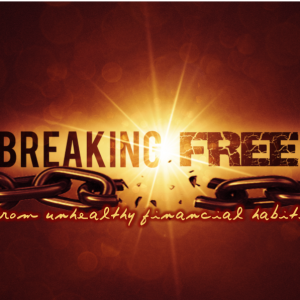Breaking Free Financially
1. Share a story of a time you tried to break a bad habit or develop a good one. How did it go?
2. Deuteronomy 8:18 tells us that only God gives us the ability to produce wealth. We must develop the habit of making resources, not wasting them. If we have security in God, why do you think there is so much tension in our lives concerning money? Christianity believes that what is mine is God’s and I’m willing to share it. How can you develop a greater trust in God that facilitates sharing our resources? Describe what life changes you could make so your life more deeply reflects God as your source.
3. Why is it that some people have a difficult time with making money honestly and instead are drawn to get-rich-quick schemes? Proverbs 16:11 states, “The Lord demands fairness in every business deal; he sets the standard.” Whether you are in business or not, how can you display fairness in your dealings with every individual?
4. If we love God, we give Him honor above everything else. Our first offering to Him should always be the thing we most want God to bless. The Bible describes four actions we can take to put God first.
• What does God promise in Proverbs 3:9 –10?
• What is the purpose of our giving as outlined in Deuteronomy 14:23?
• According to Malachi 3:10, where (place) should you bring your tithe?
• 1 Corinthians 16:2 tells us we should put aside some of what we have earned during the week. When should we give?
5. Read Proverbs 21:20. What does this verse say about the character of the person who chooses not to save for the future? Since the Bible tells us to save money, why do you think some believers have difficulty making a commitment to save on a regular basis? If you are working hard to earn a living, and not saving, you are working for money. How could saving cause money to work for you?
6. Proverbs 27:23-24 suggests that you should keep track of your “flocks and herds.” What would that mean for your family, in today’s economy? What are the consequences of not knowing the full extent of your financial picture?
7. Read Proverbs 21:5. What does this verse say about planning how to spend your money? If you tell your money where you want it to go, rather than wondering where it all went, what affect might it have on your family? How have you used a budget in the past? What have been the obstacles to having a budget “work” for you?
8. What do Proverbs 3:27 and Romans 3:18 say about debt? Discuss some of the common causes of debt. Does it usually happen overnight? Talk about practical steps anyone can take for paying down debt and eventually becoming debt free.
9. What advice does Proverbs 16:3 offer and what does it promise as a result? What is out of control debt likely to indicate about us? Most of us do things out of order when it comes to money: We first spend it; then worry about it; then repay it; then save it; and finally give it. Discuss what you think God’s order might be.
10. Those who seek to model a Christian life must learn discipline in every area—from food to study to finances. How has this lesson impressed you to work toward a debt free financial life?

